February 23, 2016 | David Kohn
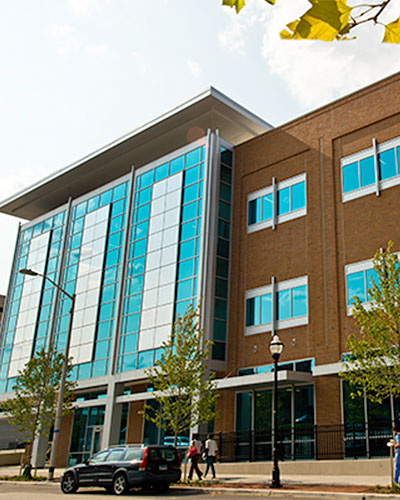
enter Offers Most Advanced, Precise Form of Radiation Therapy
The University of Maryland School of Medicine (UM SOM) announced today that the Maryland Proton Treatment Center (MPTC) has treated its first cancer patients with proton therapy at a new $200 million facility in the University of Maryland BioPark in West Baltimore.
The 110,000-square-foot center, which houses a 90-ton cyclotron, is the first in the Eastern U.S. to offer ProBeam® image guided intensity-modulated proton therapy (IMPT) --the most advanced and precise form of radiation therapy.
Unlike traditional radiation therapy, the radiation dose in proton therapy stops at the tumor site, reducing radiation dose exposure to surrounding healthy tissue, thereby reducing side effects and preventing damage to critical organs such as the heart, lungs, brain, spinal cord, liver, intestine, bladder or rectum. MPTC delivers the most precise form of proton therapy using a highly advanced technology called pencil beam scanning. With this technology, a proton beam precisely paints a tumor with radiation, using a pencil point beam that deposits dose layer by layer as it scans back and forth across the target area.
 Proton therapy has been shown to be effective in treating a wide range of localized tumors in the brain, base of the skull, head and neck area, eye, esophagus, lung, liver, breast, spinal cord and gastrointestinal tract. It is also an important treatment option for children with cancer. Nearly 60 percent of cancer patients receive a course of radiation as part of their treatment plan, and traditional radiation is still an excellent option for most. However, of those patients, as many as 30 percent may benefit from proton therapy, according to William F. Regine, MD, FACR, FACRO, the center’s executive director and the Isadore & Fannie Foxman Schneider Endowed Chairman and Professor of Radiation Oncology at the UM SOM.
Proton therapy has been shown to be effective in treating a wide range of localized tumors in the brain, base of the skull, head and neck area, eye, esophagus, lung, liver, breast, spinal cord and gastrointestinal tract. It is also an important treatment option for children with cancer. Nearly 60 percent of cancer patients receive a course of radiation as part of their treatment plan, and traditional radiation is still an excellent option for most. However, of those patients, as many as 30 percent may benefit from proton therapy, according to William F. Regine, MD, FACR, FACRO, the center’s executive director and the Isadore & Fannie Foxman Schneider Endowed Chairman and Professor of Radiation Oncology at the UM SOM.
“We are very pleased and excited to be able to make this form of radiation therapy available to cancer patients in the Baltimore-Washington region and beyond,” says Dr. Regine. “Proton therapy enables us to deliver a targeted dose of lifesaving radiation therapy directly to the tumor while minimizing radiation to healthy tissue. It can result in a more effective treatment for patients with fewer side effects. This technology is a powerful tool in our toolbox for fighting cancer.”
The University of Maryland School of Medicine (UM SOM) and its Department of Radiation Oncology are operating and managing the new proton treatment center, which was developed in partnership with Advanced Particle Therapy, LLC, based in San Diego, Calif., and Varian Medical Systems (NYSE:VAR), of Palo Alto, Calif., the world’s leading supplier of radiation therapy equipment. UM SOM faculty physicians will treat patients at the new center, which is affiliated with the University of Maryland Marlene and Stewart Greenebaum Cancer Center (GCC), a National Cancer Institute-designated cancer center. “We look forward to advancing cutting-edge clinical research for our patients at the MPTC,” said Kevin J. Cullen, MD, Professor of Medicine and GCC Director. “Our goal will be to define which patients can most benefit from this technology.”
The first adult and pediatric patients undergoing treatment at MPTC have various types of cancer and will come from Maryland and around the world. Treatment can take anywhere from one session up to eight weeks, depending on the tumor. Each appointment lasts less than an hour but the actual time it takes to deliver the proton beam is only minutes. Patients can receive proton therapy in conjunction with other cancer treatment modalities such as surgery or chemotherapy.

“Our objective at MPTC is to provide patients with the most advanced medical care, tailored to the precise needs of each individual patient,” says Zeljko Vujaskovic, MD, PhD, Professor and head of the Division of Translational Radiation Sciences in the Department of Radiation Oncology, and Director of the Maryland Proton Alliance, a new UM SOM-led organizational framework for proton therapy. “We have developed every aspect of the center with two key elements in mind: accessibility and affordability. That’s what is most important to our patients.”
Clinical research will also be a key priority of the new center, which will offer a robust clinical trial program to all its patients to further evidence-based medicine.
The UM SOM has created the Maryland Proton Alliance (to help expand scientific knowledge about proton therapy. This effort brings together the multi-platform global research and education programs of UM SOM with the clinical services of the MPTC. The MPA will combine the resources of UM SOM and industry partner Advanced Particle Therapy, LLC, with support from other public and private stakeholders.
 “This is an extraordinary opportunity,” says Dr. Vujaskovic. “As the only proton treatment center in the Baltimore-Washington region, we are in a unique position to partner with a wide range of public and private researchers, many of whom are only beginning to assess the potential value of this technology and are eager to work with a premier academic institution in these efforts.”
“This is an extraordinary opportunity,” says Dr. Vujaskovic. “As the only proton treatment center in the Baltimore-Washington region, we are in a unique position to partner with a wide range of public and private researchers, many of whom are only beginning to assess the potential value of this technology and are eager to work with a premier academic institution in these efforts.”
“Not only will patients with many – often challenging – types of cancer benefit from this type of advanced radiation therapy,” says E. Albert Reece, MD, PhD, MBA, vice president for medical affairs at the University of Maryland and the John Z. and Akiko K. Bowers Distinguished Professor and dean of the School of Medicine. “We hope that by collaborating with our research partners in the Maryland Proton Alliance that we can lead the way in advancing the science of proton therapy – and ultimately in providing more effective treatments for people battling cancer.”
Patients interested in being evaluated for treatment can call (410) 369-5200 to arrange an appointment for a consultation.
UM SOM and Maryland Proton Treatment Center, LLC broke ground on the new proton treatment center in 2012. The cyclotron, MPTC’s primary technology, arrived in 2014, and the building was completed in 2015. The center began patient consultations last fall.
When the center is operating at full capacity next year, MPTC will employ more than 170 physicians, technicians and support staff. At that time, officials expect to treat nearly 2,000 patients a year.
About the Maryland Proton Treatment Center
The Maryland Proton Treatment Center offers proton therapy – a highly advanced and precise form of radiation therapy that can increase radiation dose to tumor while decreasing dose to healthy, surrounding tissue – to the Baltimore/Washington region and beyond. It is a highly effective treatment for a wide range of localized tumors such as those found in the brain, base of the skull, head and neck area, eye tumors, tumors of the esophagus, lung, prostate, liver, breast, spinal cord, as well as gastrointestinal malignancies. It is also an important treatment option for children with cancer.
At MPTC, each treatment room will be equipped with the most advanced form of “pencil beam” proton therapy, which essentially paints the radiation onto the tumor while stopping precisely at the site of tumor. Proton therapy is performed on an outpatient basis and is a well-tolerated, non-invasive treatment that can reduce side effects. It can be used in conjunction with other modalities of cancer treatments such as chemotherapy and surgery. MPTC will offer a robust clinical trial program to all its patients to further evidence-based medicine.
MPTC has been patient-centered from the beginning – with a focus on accessibility and affordability. The center was designed to be a regional resource, providing the same training, privileges and clinical guidelines to physician groups across the region who will work side-by-side with MPTC faculty and staff, thus improving efficiency and affordability. MPTC offers free concierge services to ensure a seamless patient experience and a successful reconnection back to their referring physician. One of the goals of MPTC is to remain cost-neutral to insurance providers, meaning patients will pay the same for proton treatment as they would for other more conventionally available intensity-modulated treatments at the University of Maryland.
mdproton.com
About the University of Maryland School of Medicine
The University of Maryland School of Medicine was chartered in 1807 as the first public medical school in the United States and continues today as an innovative leader in accelerating innovation and discovery in medicine. The School of Medicine is the founding school of the University of Maryland and is an integral part of the 12-campus University System of Maryland. Located on the University of Maryland’s Baltimore campus, the School of Medicine works closely with the University of Maryland Medical Center and Medical System to provide a research-intensive, academic and clinically based education. With 43 academic departments, centers and institutes and a faculty of more than 3,000 physicians and research scientists, plus more than $400 million in extramural funding, the School is regarded as one of the leading biomedical research institutions in the U.S. with top-tier faculty and programs in cancer, brain science, surgery and transplantation, trauma and emergency medicine, vaccine development and human genomics, among other centers of excellence. The School is not only concerned with the health of the citizens of Maryland and the nation, but also has a global presence, with research and treatment facilities in more than 35 countries around the world. medschool.umaryland.edu/.
Contact
Department of Anesthesiology
(410) 328-6120 (phone)
(410) 328-5531 (fax)
swalsh@som.umaryland.edu
David Kohn
Director of Medicine and Science Communications
University of Maryland School of Medicine
Office of Public Affairs
dkohn@som.umaryland.edu
(410) 706-7590
Related stories

Tuesday, February 19, 2019
Dr. Robert C. Miller, National Leader in Radiation Oncology, Named New Medical Director of Maryland Proton Treatment Center
William F. Regine, MD, FACR, FACRO, The Isadore and Fannie Schneider Foxman Chair and Professor of Radiation Oncology at the University of Maryland School of Medicine (UMSOM), along with UMSOM Dean E. Albert Reece, MD, PhD, MBA, announced today that Robert C. Miller, MD, MBA, FASTRO a nationally-recognized radiation oncologist who currently serves as Vice Chair in the Department of Radiation Oncology at the Mayo Clinic, has been named Professor in the UMSOM Department of Radiation Oncology and Medical Director of the Maryland Proton Treatment Center (MPTC). He will begin his new position in April 2019.
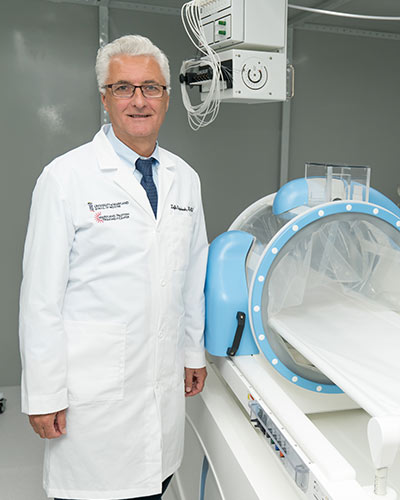
Monday, October 08, 2018
High-Precision Proton Therapy More Effective in Treating Certain Cancers When Combined with Thermal Therapy
The Maryland Proton Treatment Center (MPTC) is now offering deep-tissue external thermal therapy in combination with high-precision proton-beam radiotherapy as a potential way to boost survival chances for certain cancer patients. MPTC is the only center in the world to offer these two treatments at the same facility, an advantage to patients because these therapies are typically given within an hour of each other.
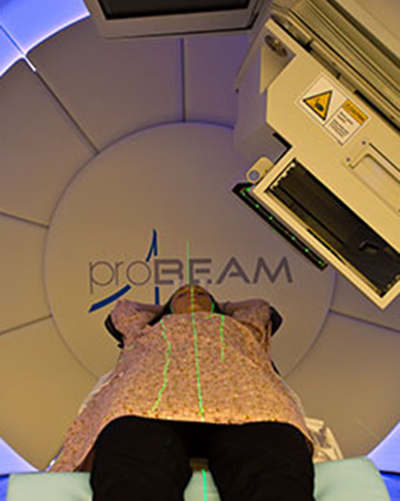
Tuesday, September 04, 2018
Maryland Proton Treatment Center Eyes Future, Strengthens Capital Structure with $277.4 Million Bond Deal
The Maryland Proton Treatment Center (MPTC) announced today that it has taken a major step in strengthening its balance sheet and capital structure to better position it to treat a growing number of cancer patients with its state-of-the-art therapy.
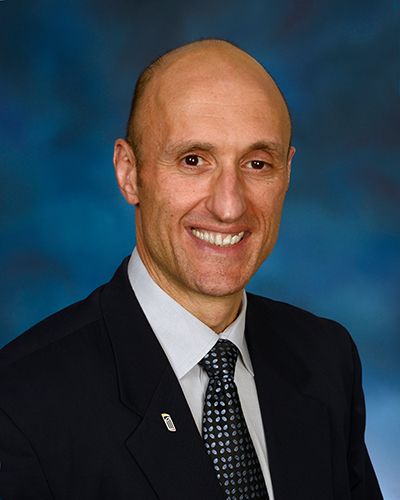
Thursday, October 27, 2016
Dr. William F. Regine is Awarded 2016 Entrepreneur of the Year From the University of Maryland, Baltimore
William F. Regine, MD, FACR, FACRO, the Isadore & Fannie Schneider Foxman Endowed Chair and Professor in Radiation Oncology at the University of Maryland School of Medicine (UM SOM) and Executive Director of the Maryland Proton Treatment Center (MPTC) has been awarded the 2016 Entrepreneur of the Year from the University of Maryland, Baltimore (UMB).

Wednesday, June 01, 2016
Maryland Proton Treatment Center Celebrates Grand Opening
The Maryland Proton Treatment Center celebrated the grand opening of its new $200 million, 110,000-square-foot facility in West Baltimore on June 1. More than 600 people – faculty members and staff, elected officials, community doctors and cancer survivors – attended the event. June 1 is National Cancer Survivors Day, and the event, which had a 'Survivor' theme, based on the reality TV show, also honored cancer survivors. The new facility is the first proton treatment center in the Baltimore-Washington area.
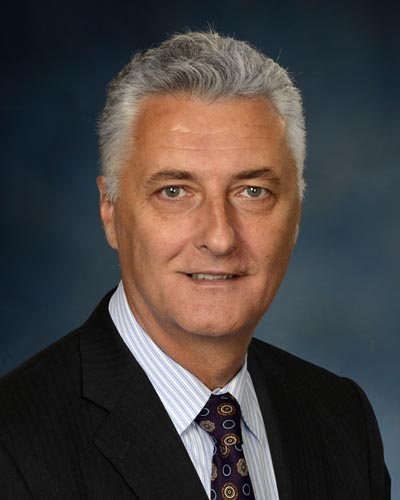
Wednesday, February 03, 2016
UM SOM Announces 'Maryland Proton Alliance' to Advance Patient-Centered Cancer Care and Precision Medicine
William F. Regine, MD, FACR, FACRO, Chairman of the Department of Radiation Oncology at the University of Maryland School of Medicine (UM SOM), along with UM SOM Dean E. Albert Reece, MD, PhD, MBA, today announced the establishment of the Maryland Proton Alliance (MPA), a new organizational framework for proton therapy at UM SOM that may serve as a national model for patient-centered cancer care. The Alliance will be led by Zeljko Vujaskovic, MD, PhD, Professor in the Department of Radiation Oncology and head of the department’s Division of Translational Radiation Sciences. Dr. Vujaskovic succeeds Minesh Mehta, MBChB, who served as Medical Director of the Maryland Proton Treatment Center (MPTC) during its development from 2012 to 2015.
